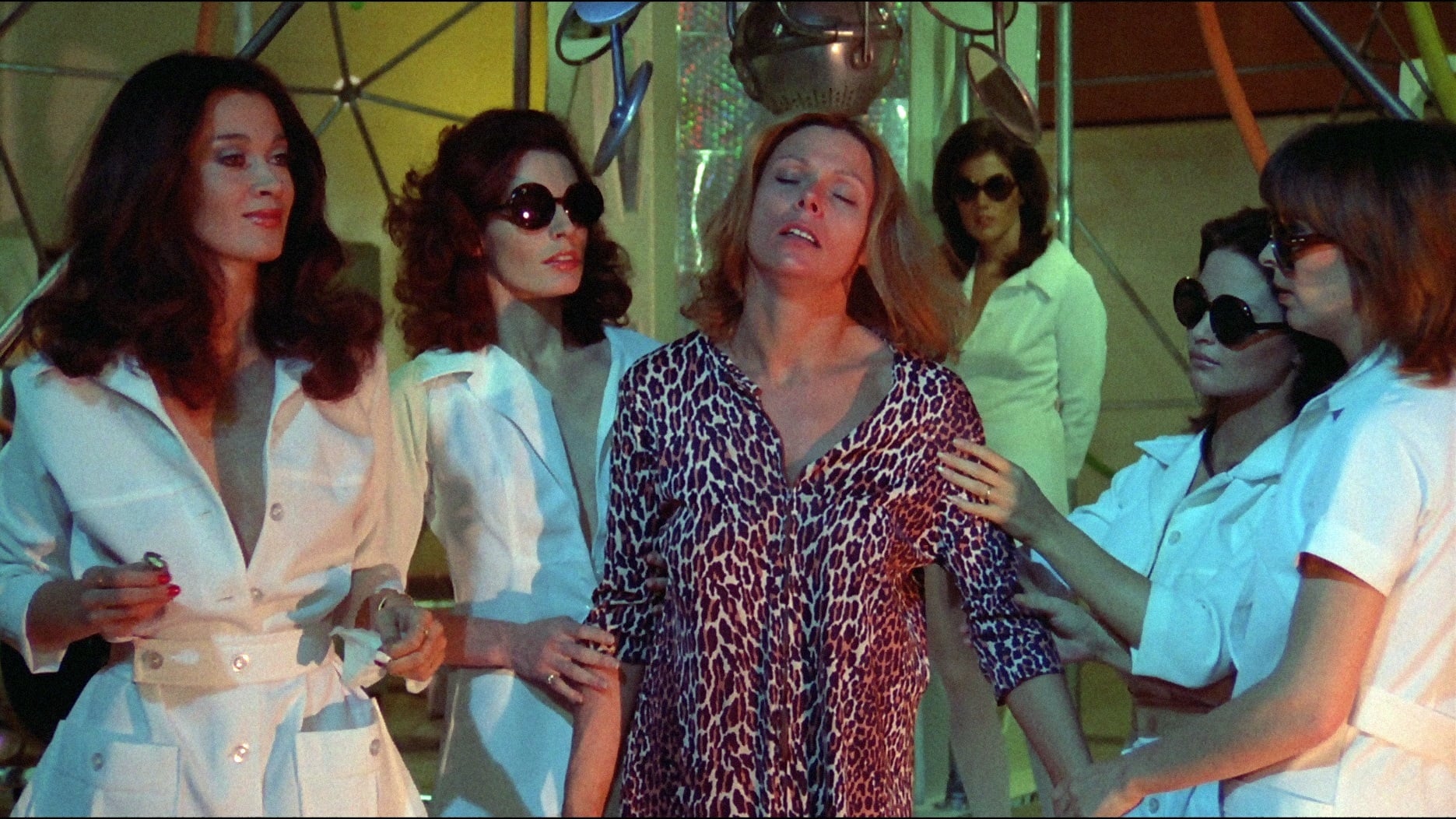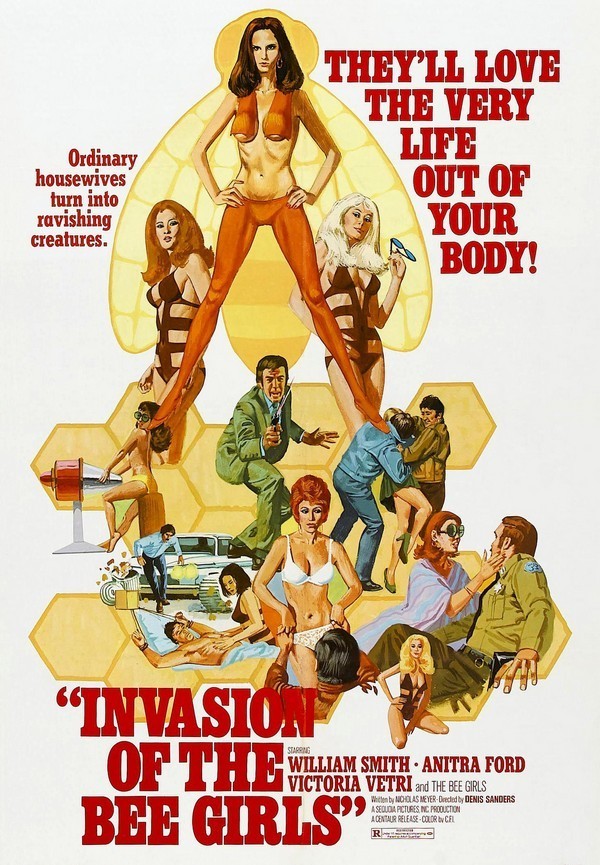Crew
Director – Denis Sanders, Screenplay – Nicholas Meyer, Photography – Gary Graver, Music – Charles Bernstein, Special Effects – Joe Lombardi, Art Direction – Elayne Cedar. Production Company – Sequoia Pictures.
Cast
William Smith (Neil Agar), Anitra Ford (Dr Susan Harris), Victoria Vetri (Julie Zorn), Cliff Osmond (Captain Jim Peters), Ben Hammer (Dr Herb Klein), Anna Aries (Nora Klein), Sid Kaiser (Dr Stan Williams), Katie A. Saylor (Gretchen Grutowski), Wright King (Dr Murger), Beverly Powers (Harriet Williams)
Plot
Police officials in the Northern California town of Peckham are baffled by a series of killings where men have all been found exhausted in the act of sexual intercourse. A state investigator finds that women at a nearby laboratory are using a radiation-mutated bee serum to turn themselves into bee creatures and are being driven to kill men with sex.
The 1970s offered a big fad of films about Nature turning against humanity. The progenitor of these was Alfred Hitchcock’s The Birds (1963) and this was followed by the likes of The Hellstrom Chronicle (1971), Willard (1971), Frogs (1972), Night of the Lepus (1972), Phase IV (1974), Squirm (1976), Kingdom of the Spiders (1977) and The Swarm (1978), among many others. All of these featured society at siege from various aspects of nature.
Invasion of the Bee Girls is clearly a wannabe in the Nature’s Revenge cycle but plainly does not have the budget to afford these other film’s visions of apocalyptic onslaught. Its solution is to cheerfully cuts its costs by coming up with a story of women turned into killer bees. In fact, it is so economically effective at creating a zero budget threat that it gets away with barely even showing a single bee throughout. And unlike what would have been mandatory for a monster movie in the 1980s and 90s, we never see any of the women transforming into bee creatures other than their development of dark contact lenses.
Invasion of the Bee Girls is cheerfully an exploitation film. Every single member of the substantial female cast list gets topless, for example. What sets it above any other exploitation film is its tongue-in-cheek cheerfulness. First, there is the outrageously silly premise – women injecting radiation-mutated bee venom to become queen bee creatures that exhaust the town’s menfolk in the heat of sexual passion.

The script comes from Nicholas Meyer. Shortly after this, Meyer published a novel called The Seven Per Cent Solution (1973), which became a bestseller and was made into a popular film in 1976. Meyer himself later embarked on a directorial career with the genre likes of Time After Time (1979) (see below). Meyer fills the script for Invasion of the Bee Girls with all manner of witty lines – after a town hall meeting decides that the solution to the killings is sexual abstinence, a disgruntled scientist returns to his marital bed “Abstinence isn’t a new thing around here” to which his wife replies “If I was positive it would kill you, I’d do it.”
On the other hand, director Denis Sanders treats the exercise with more seriousness than Nicholas Meyer clearly intended. Unlike Meyer, Denis Sanders never went on to any subsequent fame but there are occasional moments that suggest that he might have been capable of something more. While his handling of actors is clearly amateurish, Sanders delivers scenes that fall between the cheesy and the lyrical – a lyrical hillside romp, parodying 1970s nudie movies, that turns into a bee attack; and Anitra Ford’s seduction of a scientist and slow undressing to classical music.
Invasion of the Bee Girls‘s finest moment, which hits a perfect note of exploitation movie poetry, is a scene where the bee women coat a topless women in honey and place her in a radiation machine, where she is entirely covered in bees to then emerge with dark eyes, whereupon all the other women start caressing their breasts to the accompaniment of classical music.
Nicholas Meyer went on to direct Time After Time (1979) where H.G. Wells pursues Jack the Ripper through time to the present; Star Trek II: The Wrath of Khan (1982), regarded by most Trek fans as the best of the film series; the controversial nuclear war tv movie The Day After (1983); the little seen Merchant-Ivory production The Deceivers (1988) about Indian Thuggee cults; before returning to helm the last of the classic Trek films Star Trek VI: The Undiscovered Country (1991). He has also made a couple of comedies as director, the literary pastiche Volunteers (1985) and the spy spoof Company Business (1991), which did no business. His other genre entries include the scripts for the tv movie The Night That Panicked America (1975) about the infamous 1938 Orson Welles War of the Worlds radio broadcast; and The Voyage Home: Star Trek IV (1986). From the late 1990s, Meyer moved away from directing to writing scripts such as Sommersby (1995), The Prince of Egypt (1998), The Human Stain (2003) and Houdini (tv mini-series, 2014), plus created the tv series Medici, Masters of Florence (2016– ). He also produced the epic tv mini-series The Odyssey (1997), the Arnold Schwarzenegger action vehicle Collateral Damage (2002) and the tv series Star Trek: Discovery (2017-24).
Trailer here


